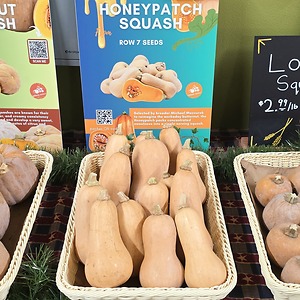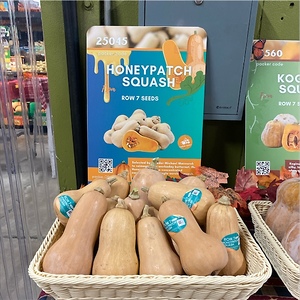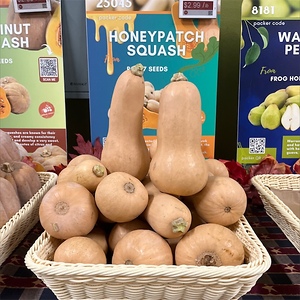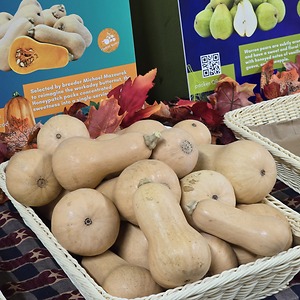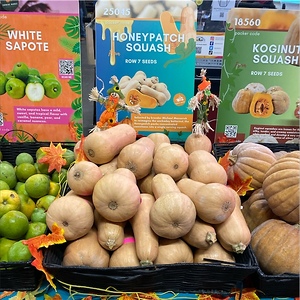


Honeypatch Squash
Estimated Inventory, 35 lbs : 0
This item was last sold on : 02/17/25
| Row 7 Seeds | Homepage |
Description/Taste
Honeypatch squashes are miniature gourds that measure between 10 and 15 centimeters long. They have an elongated pear-like shape with a bulbous base that tapers into a more slender, rounded neck with a prickly, light brown stem at the top. These squash have thin, firm skin that is smooth and shiny, transitioning from pale green to a solid light orange or tan hue. This skin is primarily matte with faint, light stripes subtly visible beneath the surface. Beneath the skin is bright orange flesh with a dense, semi-dry texture that becomes creamy, tender, and custard-like when cooked. Honeypatch squashes have a rich, nutty, and sweet yet savory flavor with malt-like qualities and a touch of honey.
Seasons/Availability
Honeypatch squashes are available in the fall.
Current Facts
Honeypatch squashes are known botanically as Cucurbita moschata and belong to the Cucurbitaceae family, which also includes melons, cucumbers, gourds, and pumpkins. This variety is also referred to as the 898 squash and was created by Row 7 Seeds, a New York-based company concentrated on new vegetable varieties bred for flavor rather than mass production. Honeypatch squashes are often likened to Butternut squash for their similar flavors and characteristics, but they are a distinct variety with a handheld size and edible skin, developed to improve upon Butternut squash traits. Honeypatch squashes are a high-yielding variety prized for their culinary properties, offering a concentrated sweet flavor and convenient, single-serving size.
Nutritional Value
The nutritional value of Honeypatch squashes is not widely known but likely have similar benefits to Butternut squashes, which are a source of beta-carotene, a pigment found in plants with orange and yellow hues that converts to vitamin A in the body. This nutrient is beneficial for the immune system, eye health, and reduces free radical cell damage. These squashes also provide the body with vitamin C, promoting skin health and preventing iron deficiency. Vitamin E further enhances antioxidant protection, supporting infection and inflammation defense, wound healing, and reducing macular degeneration of the eyes. The vitamin B6 found in squash plays a key role in brain health, mood regulation, and energy metabolism, while also aiding in the production of red blood cells. Squashes contain the minerals manganese and magnesium, which are essential for bone health, muscle function, and energy production.
Applications
Honeypatch squashes are rarely eaten raw and are most commonly enjoyed cooked. A popular preparation involves slicing them in half lengthwise, removing the seeds, and brushing the flesh with olive oil and salt. Once roasted, the natural sweetness and concentrated flavor of Honeypatch squashes require minimal seasoning. This vegetable can be topped with savory miso butter and white miso paste, dusted with cinnamon and vanilla, or roasted with harissa or Calabrian butter. They may be pureed for a smooth, creamy texture similar to mashed yams or sweet potatoes. Their custard-like flesh is ideal for soups or as a substitute for butternut squash in casseroles, grain bowls, salads, curries, and stir-fries. Drizzle roasted Honeypatch squashes with maple syrup and brown sugar for a dessert-like treat. This vegetable can be baked with ingredients like onions, sage, pumpkin pie spice, nutmeg, cumin, thyme, rosemary, parsley, parmesan and feta cheese, pecans, walnuts, pumpkin seeds, hazelnuts, dried cranberries, apples, and pomegranates. They should be stored in a cool, dark location.
Ethnic/Cultural Info
Honeypatch squashes were invented by Row 7 Seeds, a company that works with breeders, seedspeople, farmers, and chefs to develop and discover new vegetables, many of which are crossbred hybrids. The story of Honeypatch squashes began when chef Daniel Barber, one of the creators of Row 7 Seed’s Koginut squash, teamed up with vegetable breeder Michael Mazourek. Their goal was to create a new, single-serving version of Butternut squash that maintained a rich flavor without sacrificing ease of growth and production. Mazourek gathered fellow breeders Molly Jahn and Richard W. Robinson at Cornell University to develop a small squash called the Honeynut. The problem with this variety was that its thin skin shortened its durability and the vegetable wouldn’t last through the whole fall season. Mazourek continued to experiment with crossbreeding until he came up with the Honeypatch squash, which had the same flavorful qualities as the Honeynut but with longer storing capabilities.
Geography/History
Honeypatch squashes were developed by Row 7 Seeds and originally named the 898 squash. The goal of this variety, and all vegetables created by Row 7 Seeds, is to enhance flavors without compromising on durability. The company donates a portion of their Honeypatch squash sales to the Cornell University breeding program to support the continued production of new vegetables. Honeypatch squashes grow in temperate climates with light frosts and temperatures that never decrease below -2 degrees Celcius. They have become more widely known after appearing in recipes for the meal kit delivery service Blue Apron. As a cultivated variety, they are not found in the wild but are grown commercially by regional farmers and sown in home gardens by seed. Honeypatch squashes are most likely sourced from grocers, specialty stores, and farmers’ markets on the East Coast, particularly in Massachusetts and New York.



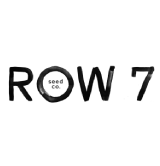
 Learn More...
Learn More...